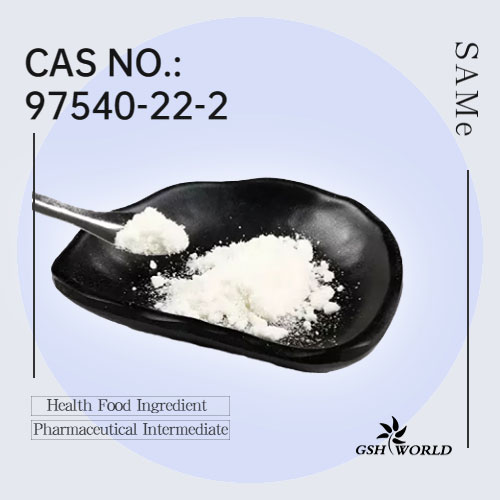Continuous IHC can lead to cirrhosis, liver injury, liver failure, liver cancer and other pathological changes. In vitro supplementation of adenosylmethionine is an important therapeutic method to improve IHC.
What is adenosylmethionine?
Adenosylmethionine, also known as S-adenosyl-l-methionine, is a naturally active substance present in the body.
Adenosylmethionine can participate in important biochemical reactions in vivo, the main mechanisms of action are methyl, propylamine, sulfur and so on.
Based on the above mechanism of action, adenosylmethionine plays an important role in the treatment of patients with hepatocellular cholestatic liver disease such as alcoholic liver disease, drug-induced cholestasis,
viral hepatitis, and intrahepatic cholestasis during pregnancy.
Intrahepatic cholestasis (IHC) is common in various chronic liver diseases,
and the number of chronic liver disease patients in China is about 450 million.
The incidence of IHC increases with the age of liver disease patients. In the context of population aging, the scale of IHC patients will further expand.
Continuous IHC can lead to cirrhosis, liver injury, liver failure, liver cancer and other pathological changes. In vitro supplementation of adenosyl methionine is an important therapeutic method to improve IHC.
According to the “2024-2028 China adenosyl methionine Market Monitoring and Future Development Prospects Research Report” released by the Industrial Research Center,
based on the huge scale of IHC patients and the increasing aging trend,
the global adenosyl methionine market space continues to expand, reaching more than 10 billion yuan at this stage.
There are many types of adenosyl methionine, such as raw material, injection, enteric-coated tablets, etc. Among them, the technical barrier of adenosyl methionine is higher.

Globally, Companies distributing adenosine market include Shenzhen GSH Bio-Technology Co.,LTD., Jilin GSH Bio-Technology Co.,LTD., Anhui GSH Bio-Technology Co.,LTD., Jilin Aoteng Bio-Technology Co.,LTD. Let’s wait.
Adenosylmethionine p-toluenesulfonate and adenosylmethionine butylene disulfonate are the main salt forms of adenosylmethionine.
The synthesis methods of adenosylmethionine include microbial fermentation,
biological enzyme conversion and chemical synthesis, among which microbial fermentation is cheaper and easier to achieve industrial production.
In recent years, the microbial fermentation method of adenosylmethionine has made great progress all over the world. Due to the rapid increase in demand, improving the yield of adenosylmethionine through strain improvement has attracted market attention.
In order to meet the market demand, there are many adenosine related construction projects in China, and the relevant projects in 2024 include:
Zhejiang Zhenyuan Pharmaceutical 100 tons of p-toluenesulfonate adenosine methionine /50 tons of butyldisulfonate adenosine methionine
The annual output of Jiangxi Chengchi Biological is 40 tons of food-grade adenosine p-toluene sulfonate /20 tons of drug-grade adenosine 1,4 butyldisulfonate
The annual output of Guizhou Kabenkangda Bio is 100 tons of adenosine butyldisulfonate injection and enteric-coated tablets.
Industry analysts said that adenosyl methionine is the most important methyl donor in the body, which has the role of protecting the liver, improving arthritis, improving mood, anti-inflammatory, anti-tumor, etc., and is widely used in medicine, food, health products and other fields.
After years of development, China’s adenosylmethionine market has been greatly developed,
the proportion of brands has been continuously improved, and the production capacity has been exported to overseas markets while meeting the demand of the domestic market.
